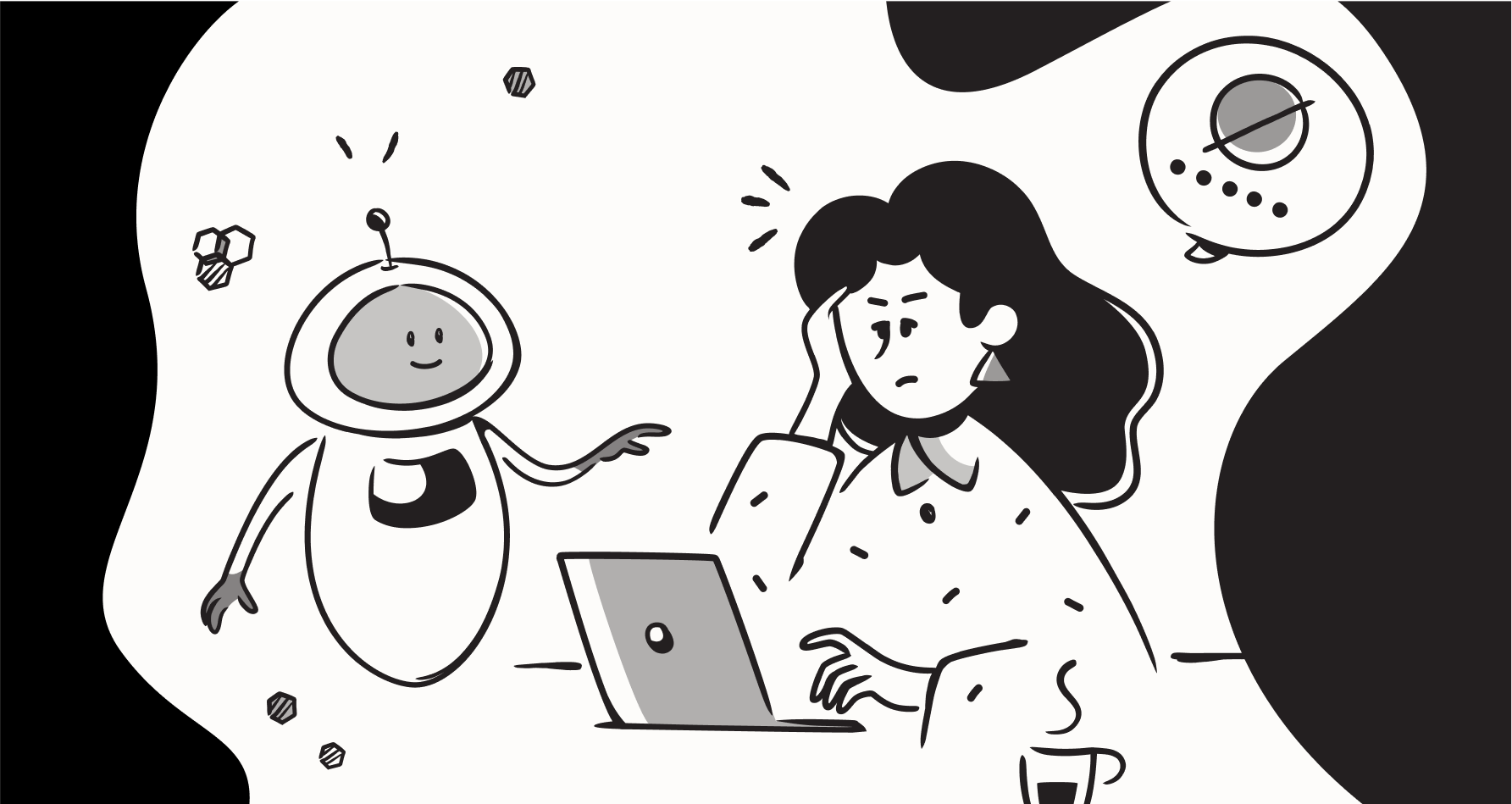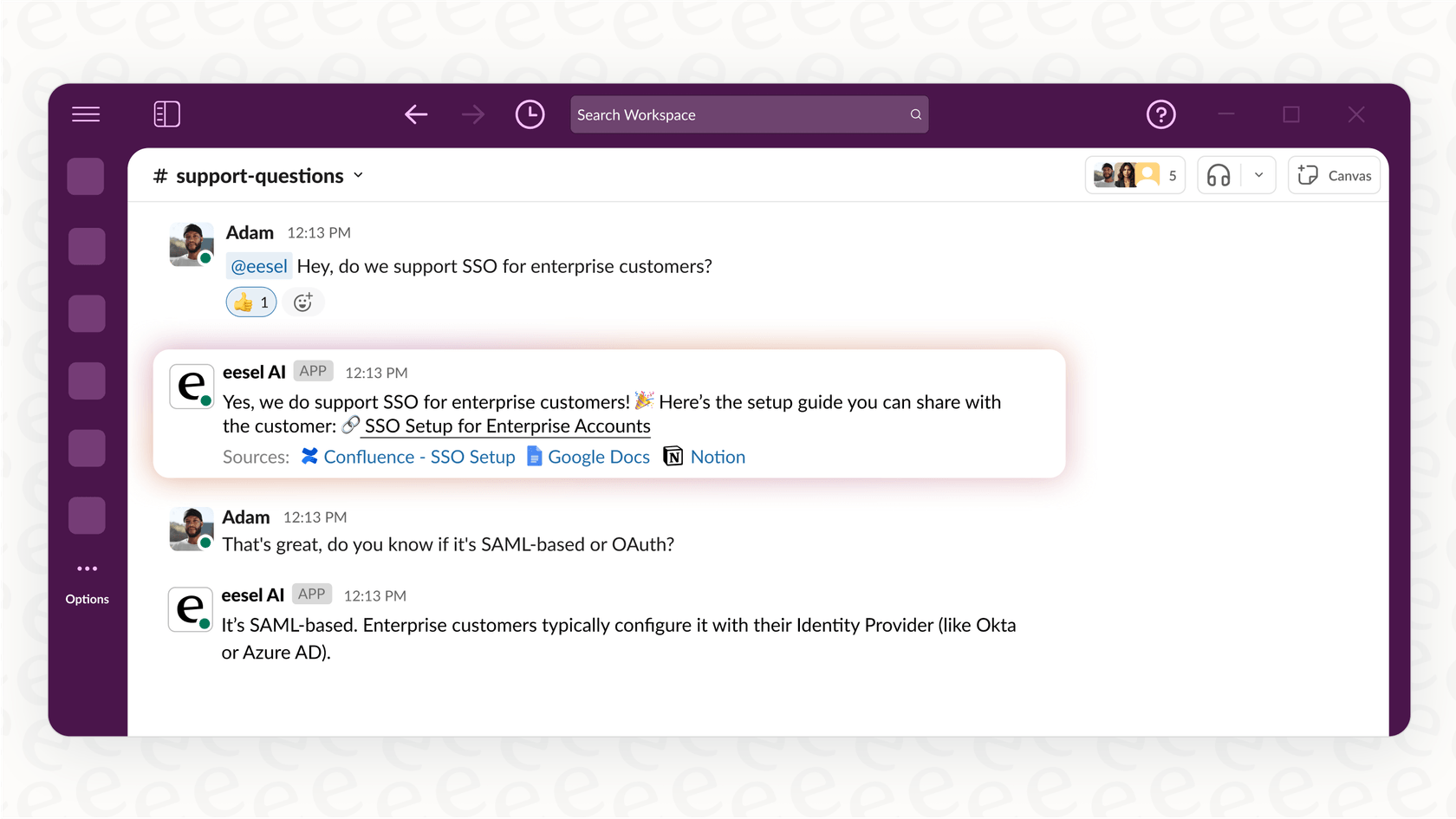
If you've been looking for Microsoft Delve lately, you probably noticed it's vanished. You’re not going crazy, as of December 2024, Microsoft officially pulled the plug on Delve.
For a lot of teams, Delve was a handy tool for stumbling upon documents and figuring out who’s who across the Office 365 world. Now that it's gone, there's a bit of a hole, especially for companies trying to keep their internal knowledge from getting lost.
While Microsoft has sort of sprinkled Delve's features into its other apps, this is actually a great excuse to upgrade to a modern, AI-powered knowledge platform. Today’s tools can do way more than Delve ever could, bringing together information from all your apps (not just Microsoft’s) and giving you answers right where you're already working.
What was Microsoft Delve?
So, what exactly was Microsoft Delve? Think of it as a discovery tool for the Microsoft 365 universe. It used something called the Office Graph to guess what documents and people might be relevant to you based on your recent activity and colleagues.
The big idea was to help you find stuff without having to remember which SharePoint site or OneDrive folder it was buried in. It was an attempt to cut down on all that time spent digging around for information.
A few of its main features were:
-
Content Cards: A Pinterest-style board that showed you documents from OneDrive and SharePoint that you had permission to see.
-
Profile Pages: A single spot to find out about your coworkers, see the org chart, and check out the public documents they were working on.
-
Boards: A simple way to group related documents for a project, kind of like making a personal playlist for your files.
Microsoft’s official reason for retiring Delve is that its core features now live in other parts of Microsoft 365, like Profile Cards, Microsoft Search, and the "For you" section in OneDrive. While that’s true, it has left people with a clunkier experience, forcing them to jump between different apps to find what they need.
Why a search bar won't cut it as a Delve replacement
The end of Delve shines a light on a few problems that a simple search bar just can't solve. If you're looking for a real replacement, you need a tool that understands how teams actually get work done today.
First off, your company's knowledge is scattered all over the place. Delve was always stuck inside the Microsoft bubble, but your team’s most valuable information is probably everywhere else, too. You’ve got product specs in Confluence, project plans in Google Docs, customer feedback in Zendesk, and big decisions happening in Slack. Any replacement that can't tap into all those sources is already missing half the story.

Second, search waits for you to act. Delve at least tried to show you useful info before you even thought to ask. A standard search bar just sits there, waiting for you to type in the perfect keywords. Modern teams need a system that gets the context of their work and delivers knowledge to them without breaking their focus.
And finally, you need answers, not just a list of documents. Delve would point you to a file, and then it was up to you to open it and spend another ten minutes scanning for the one sentence you actually needed. That’s a huge time-waster. A proper modern alternative uses AI to read and understand the content for you, giving you a direct answer in seconds.
This is the real headache with tools that don't talk to each other. A smart system doesn't just show you a file; it pulls information from everywhere to give you a complete answer. Platforms like eesel AI are built specifically to connect all these different sources and turn that ocean of documents into one trustworthy brain for your company.
Finding a modern, AI-powered alternative to Delve
Okay, let's get into what a true replacement for Delve should do and how it solves the problems we just talked about. This isn't about finding a carbon copy of Delve's features; it's about leveling up your whole approach to managing knowledge.
A true Delve alternative needs to connect to everything
A real Delve alternative has to have one-click integrations with all the tools your team actually uses every day, not just the ones from a single company. The aim is to create one searchable brain for your entire company, no matter where a piece of information lives.
This is where a dedicated AI platform really makes a difference. Instead of being trapped in Microsoft 365, eesel AI connects to over 100 popular platforms. You can train it on past support tickets from a helpdesk like Zendesk, your internal wiki in Confluence, and your shared project plans in Google Docs to create a single source of truth.
A Delve alternative should give you answers, not just links
The ultimate goal is to stop making employees "delve" through documents in the first place. The tool should give you straight, simple answers to questions asked in normal language, and it should always show you where it got the information so you can check its work.
With a modern AI tool, your team can ask questions right from inside Slack or Microsoft Teams. For example, a new person in sales could ask, "What's our discount policy for non-profits?" and get an instant summary pulled from the official policy doc, without having to ping their manager or go on a scavenger hunt through the shared drive.

Here’s a quick comparison of the old way versus a unified AI platform:
| Feature | Microsoft 365 (Post-Delve) | eesel AI (A Modern Alternative) |
|---|---|---|
| Knowledge Sources | Stuck in the Microsoft ecosystem. | Connects to 100+ apps you actually use. |
| User Experience | Fragmented across different apps. | Unified AI chat in Slack, Teams, and more. |
| Primary Function | Finds links to files and people. | Gives you straight answers & helps automate work. |
| Setup & Integration | Built-in, but siloed and needs admin setup. | Set it up yourself in minutes. No devs needed. |
| Core Use Case | Basic file discovery. | Company-wide Q&A and support automation. |
How to set up a modern Delve alternative in minutes
Remember the pain of setting up old enterprise software? The projects that dragged on for months and needed a whole team of developers? A modern Delve alternative should be the exact opposite: simple and fast.
Here’s just how easy it is to get going with a tool like eesel AI.
Step 1: Instantly connect all your knowledge sources
You can forget about complicated setup projects and mandatory sales demos. With eesel AI, you just sign up and start connecting your apps by securely logging into them. There's no custom coding or long onboarding calls required just to see if it’s a good fit. You can connect your most important knowledge hubs in a few clicks.

Step 2: Deploy the AI where your team already works
A great knowledge tool shouldn't be another app your team has to remember to check. The best platforms meet you where you are. You can deploy your AI as a helpful bot in Slack or MS Teams, or even add it as a copilot right inside your helpdesk. This makes sure it’s always there to answer questions without pulling your team away from their work.
Step 3: Get instant answers to any question
Once your sources are connected, your team can start asking questions right away. Someone on the IT team can ask, "How do I set up a new developer environment?" and get a step-by-step guide pulled from a Confluence page, right in Slack. A support agent can ask about a tricky customer issue and get a clear answer based on how similar tickets were solved before.
The future of knowledge after Delve is already here
Look, Microsoft Delve was a neat idea, but its retirement is a sign of the times. The old model of having a separate place to hunt for files just doesn't work anymore. The future isn't about searching for documents; it's about getting quick, trustworthy answers from your company's collective brain, right inside the tools you use every day.
Don't settle for a clunky system that makes your team work harder just to find information. The end of Delve is the perfect opportunity to bring in a solution that actually unifies your knowledge and gives your team a single source of truth.
Ready to see what a modern Delve alternative can do for you? Get started with eesel AI for free and build your company’s AI brain in just a few minutes.
Frequently asked questions
Microsoft retired Delve because many of its core features were integrated into other Microsoft 365 apps like Profile Cards and Microsoft Search. However, this change has often resulted in a more fragmented and less intuitive experience for users.
Microsoft Delve was primarily designed as a discovery tool that leveraged the Office Graph to surface relevant documents and insights about colleagues. Its goal was to help users find information proactively without needing to know its exact location.
Modern AI platforms significantly advance beyond Delve by connecting to all your company's applications, not just Microsoft’s, and providing direct answers to questions rather than just links. They also integrate into your existing workflows, delivering knowledge where your team already works.
Yes, Microsoft states that many of Delve's core functionalities, such as content discovery and profile viewing, have been distributed across other Microsoft 365 applications. You can find elements in Profile Cards, Microsoft Search, and the "For you" section in OneDrive.
A simple search bar struggles as a Delve replacement because company knowledge is scattered across numerous platforms outside the Microsoft ecosystem. It also requires users to proactively know precise keywords, and it typically provides a list of links rather than direct, synthesized answers.
No, modern AI knowledge platforms are designed for rapid and simple setup, often in minutes, without requiring developers. Tools like eesel AI allow you to connect your key knowledge sources with one-click integrations and seamlessly deploy the AI where your team works.
Share this post

Article by
Kenneth Pangan
Writer and marketer for over ten years, Kenneth Pangan splits his time between history, politics, and art with plenty of interruptions from his dogs demanding attention.







